|
"The Printing House of the United States." GEO. F. NESBITT & CO., General JOB PRINTERS,
BLANK BOOK Manufacturers,
STATIONERS, Wholesale and Retail,
LITHOGRAPHIC Engravers and Printers,
COPPER-PLATE Engravers and Printers,
CARD Manufacturers,
ENVELOPE Manufacturers,
FINE CUT and COLOR Printers.
163,165,167, and 169 PEARL ST., 73, 75, 77, and 79 PINE ST., New-York. ADVANTAGES—All on the same premises, and under the immediate supervision of the proprietors. |
TO NEWS-DEALERS. PUNCHINELLO'S MONTHLY. THE FIVE NUMBERS FOR APRIL, Bound in a Handsome Cover, Will be ready May 2d. Price, Fifty Cents. THE TRADE SUPPLIED BY THE AMERICAN NEWS COMPANY, Who are now prepared to receive Orders. |
HARRISON BRADFORD & CO.'S STEEL PENS. These pens are of a finer quality, more durable, and cheaper than any other Pen in the market. Special attention is called to the following grades, as being better suited for business purposes than any Pen manufactured. The "505," "22," and the "Anti-Corrosive." We recommend for bank and office use. D. APPLETON & CO.,
Sole Agents for United States.
|
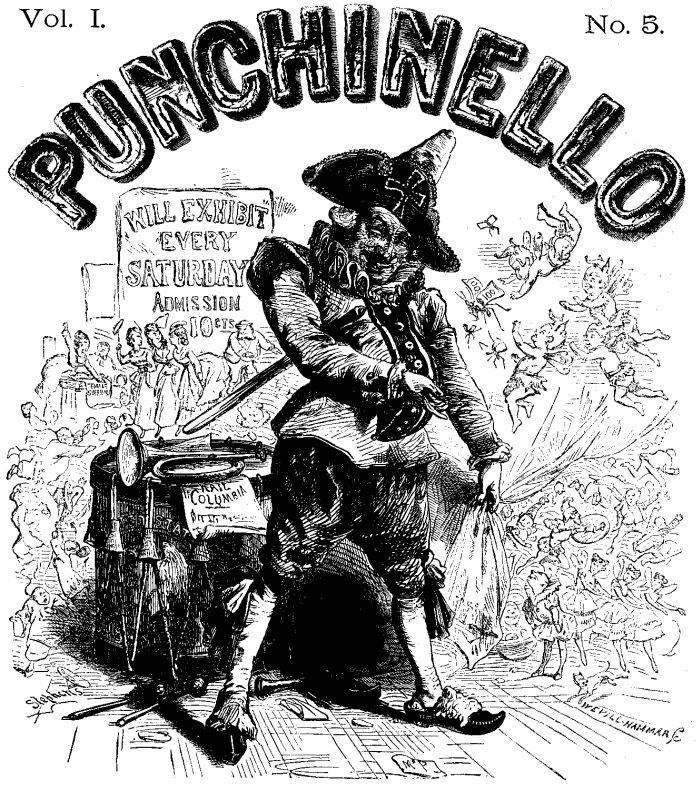
PUNCHINELLOVol. I. No. 5.SATURDAY, APRIL 30, 1870. PUBLISHED BY THEPUNCHINELLO PUBLISHING COMPANY,83 NASSAU STREET, NEW YORK. |
|
CONANT'S PATENT BINDERS for "Punchinello," to preserve the paper for binding, will be sent, post-paid
on receipt of One Dollar, by "Punchinello Publishing Company," 83 Nassau Street, New-York City.
PRANG'S CHROMOS are celebrated for their close resemblance to Oil Paintings. Sold in All Stores through out the World
PRANG'S WEEKLY BULLETIN OF CHROMOS.—"Easter Morning" "Family Scene in Pompeii"
"Whittier's Birthplace," Illustrated Catalogue sent, on receipt of stamp, by L. PRANG & CO., Boston |
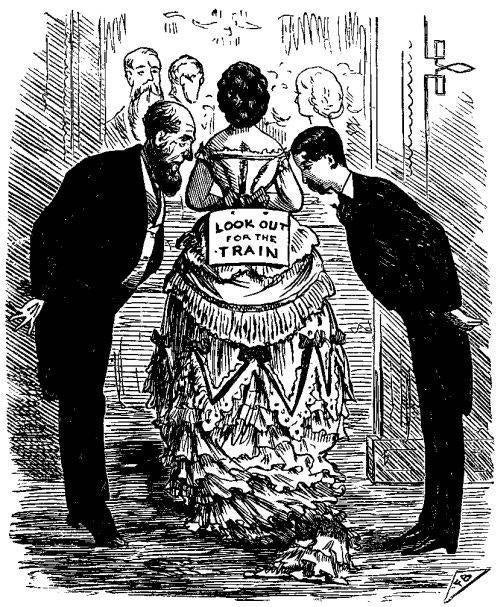 THE WARNING OF THE BELLE LOOK OUT FOR THE TRAIN. PATRIOTIC ADORATION. A TALE OF PHILADELPHIA. People of the Quaker City,How the world must stand aghast At your wondrous veneration For those relics of the past, Kept in such precise condition, Fostered with such tender care— Don't, oh! don't the Philadelphians Love old Independence Square? Splendid are its walks and grass-plots Where the bootblacks base-ball play, And its seats resembling toad-stools, On which loafers lounge all day, Waiting for their luck, or gazing At the office of the Mayor— Don't, oh! don't the Philadelphians Love old Independence Square? Then, behold the fine old State-house Cleanly kept inside and out, Where the faithful office-holders Squirt tobacco-juice about: Placards highly ornamental Decorate its outward wall— Don't, oh! don't the Philadelphians Love old Independence Hall? O! ye gods and little fishes! Could bill-sticker be so vile As to paste up nasty posters On the sacred classic pile? Greece and Rome yet have their relics, But what are they? very small. Never half so venerated As old Independence Hall. PERIODICAL LITERATURE. PUNCHINELLO has hitherto refrained from criticising the periodicals of the day, from the mistaken idea that superlative excellence was not expected in every number of every daily or weekly journal in the land. He did not know that, if every such journal was not edited so as to suit the comprehension of all classes of cursory critics, it should be unqualifiedly condemned. Supposing that a painter should not condemn a paper for publishing a musical article beyond his comprehension, and that an architect ought not to get in a rage because he finds in his favorite journal a paper on beavers which makes him feel insignificant, PUNCHINELLO has generally looked around upon his fellow-journalists, and thought them very good fellows, who generally published very good papers. He did not find superlative excellence in any of their issues, but then he did not look for it. He might as well pretend to look for that in the journalists themselves, or in society at large. But he has lately learned, from the critics of the period, that he ought to look for it, and that it is the proper thing nowadays to pitch into every journal which does not, in every part, please every body, whether they be smart or dull; those quick of appreciation, or those slow gentlemen who always come in with their congratulations upon the birth of a joke at the time its funeral is taking place. And so, PUNCHINELLO will do as others do, and will occasionally view, from the loop-hole in his curtain, the successes and failures of his neighbors, and will give his patrons the benefit of his observations. The first thing he notices to-day is, that the Evening Snail of last night is not so good as it was a fortnight ago; or, let us think a bit—it may have been a good number at the beginning of last month that he was thinking of; at all events, this last issue is inferior. The matter on the first page is not printed in nearly as good type as the original periodicals had it, and while the letters in the heading are quite fair, it is very noticeable that the I's are very defective, and there is no C in it. The "Gleanings" are excellent, and it would be advisable to have more of them—if indeed such a thing were possible in this case. The spider-work inside shows no acquaintance with the writings of BACH or GLIDDON, and there is nothing about the Spectrum Analysis in any part of the paper. Besides, the paper is too stiff and rattles too much, and PUNCHINELLO could never abide the color of the editor's pantaloons. Why will not people dress and write so that every body can admire and understand them. Especially in regard to witty things and breastpins They ought to be loud, overpowering, and so glaring that people could not help seeing them. And they ought to be a little cheap, too, or average people won't comprehend them. In both cases paste (and scissors) pays better than diamonds. The reports of private parties in the Snail are, however, very good, and if it would confine its original matter to such subjects, it could not fail to succeed. A Query for Physicians. Are people's tastes apt to become Vichy-ated by the excessive use of certain mineral waters? "Behold, how Pleasant a Thing 't is," etc. Boston has a couple of clergymen who have fallen out upon matters not precisely theological. In the summer, the Rev. Mr. MURRAY leaves his sheep, to shoot deer by torchlight in the Adirondacks. This the Rev. Mr. ALGER, in addressing the Suppression of Cruelty to Animals Society, denounces as extremely wicked. From all which Mr PUNCHINELLO, taking up his discourse, infers, First. That it is a great deal more wicked to shoot deer by torchlight than by daylight. Secondly. That the Rev. MURRAY and the Rev. ALGER are of different religious persuasions. Thirdly and lastly. That the Rev. Mr. ALGER doesn't love venison. P. S. Persons desiring to present Mr. PUNCHINELLO with a fine haunch, (in the season,) may shoot it by daylight, moonlight, torchlight, or by a Drummond light, as most convenient. We are indebted to Mr. SARONY for a number of brilliant photographs of celebrities of the day. Lovely woman is well represented the batch, with all the characters of which PUNCHINELLO hopes to present his readers, from time to time. Entered, according to Act of Congress, in the year 1870, by the PUNCHINELLO PUBLISHING COMPANY,
in the Clerk's Office of the District Court of the United States, for the Southern District of New-York. 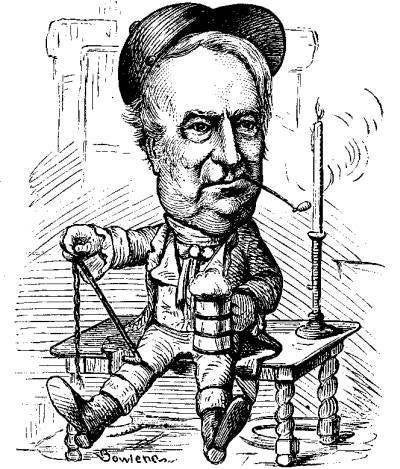 ALL ABOARD FOR HOLLAND PUNCHINELLO understands that a performance is soon to take place at the Academy of Music, for the benefit of GEORGE HOLLAND, the well-known and ever-green "veteran" of "the stage." It pleases PUNCHINELLO to know that a combination of talent and beauty is to be brought together for so worthy a purpose. Seventy-four years ago, when GEORGE HOLLAND was a small child, PUNCHINELLO used to dandle him upon his knee. Hardly four years have passed since PUNCHINELLO was convulsed by the Tony Lumpkin of HOLLAND. He distinctly remembers, too, administering hot whiskey punch to little boy HOLLAND with a tea-spoon, which may in some measure account for the Spirit subsequently infused by the capital comedian into the numerous bits of character presented by him. Considering these facts, it is manifestly an incumbent duty on the part of PUNCHINELLO to request the earnest attention of his readers to the subject of GEORGE HOLLAND'S benefit, all particulars concerning which will be given due time through the public press. It used to be said, long ago, that "the Dutch have taken Holland," Well, let our own modern Knickerbockers improve upon that notion, by taking HOLLAND'S tickets. Remember how, in the early settlement of the country, it was Holland that made New-York, and see that New-York now returns the compliment, and makes HOLLAND. Convivial songsters frequently remind us that— —"a Hollander's draught should potent be,And deep as the rolling Zuyder Zee." Mind this, all ye Hollanders who would give your support to our HOLLAND. Let your drafts be potent, your cheeks heavy, your attendance punctual. Make the affair complete; so that when, here-after, a comparison is sought for something that has been a sued people will say of it—"As big as that Bumper of HOLLAND'S." ASTRONOMICAL CONVERSATIONS. (BY A FATHER AND DAUGHTER RESIDING ON THE PLANET VENUS.) No. I. FATHER (to DAUGHTER, who is looking through a telescope.) Yes HELENE, that is the Planet Tellus, or Earth. The darker streaks are land; the bright spots, water. We begin with a low power, which shows only the masses; presently you will have the pleasure of discriminating not only rivers and chains of mountains, but cities—single houses—even Human Beings! Yes, you shall this very night read page of PUNCHINELLO, a paper so bright that every word appears surrounded by a halo! DAUGHTER. O father! do that now. How delightful, to actually read the works of these singular creature's, and become familiar with their extraordinary ideas! Were the scintillations you spoke of the other night, that were seen all over the Western Continent, the result of the flashing of these radiant pages? F. Undoubtedly, my child; they began with the first issue of the paper, and have since regularly increased in brightness, just as It has. D. It really seems as though Earth would answer for a Moon, by and by, at this rate! F. You are quite right, HELENE; it will. Or say, rather, a Sun. For you will observe that it is a warm light; not cool, as reflected light always is. It is Original. D. Well, this shows that PUNCHINELLO must have some Heart, as well as Head. Come, put on your highest power now, and let us seem to pay good old Tellus a visit! [The indulgent Father complies, and, is at some pains to adjust the focus.] F. Now, dear! take a good look. D. (Looking intently.) Oh! how splendid—how splendid! Do see the beautiful things in those Shop Windows! It must be the Spring Season there! Do see those lovely lumps on the backs of those creatures' heads! What place is it, Father? F. That? It's New-York; and the street is the famous Broadway. D. O dear! how I would like to go shopping there, this minute!—for I see it is afternoon in that quarter. Is there no way of getting there?(!!!) F. (Laughing heartily.) Well, well, HELENE! That's pretty good, for the daughter of an astronomer! Do you know that at this precise moment you are Forty-five Million, Six Hundred and Fifty-four Thousand, Four Hundred and Ninety-one Miles and a half from those Muslins! I'll tell you, Sis, what could be done: Drop a line to the Editor of PUNCHINELLO, and tell him what you want. He'll get it, some way. D. That I will, instantly! [Turns to her portfolio, while her father turns to the telescope.] "DEAR MR. EDITOR: Pardon the seeming boldness of a stranger: you are no stranger to me! Long, long have I deceived that good man, my father, by pretending to know nothing of the Earth, or of his instrument! Many and many a night, unknown to him, have I gone to the Telescope, to satisfy the restless craving I feel to know more of your Planet, and of a person of your sex whom I have often beheld, and watched with eagerness as he came and went. How thrilling the thought, that he cannot even know of my existence, and that we are forever separated! This, good and dear Editor, is my one Thought, my one great Agony. "It has occurred to me that, in this dreadful situation—my Passion being sufficiently Hopeless, as any one may see—you might at least afford me some slight alleviation, by undertaking to let Him know of the interest he excites in this far-off star! Let me describe my charmer, so that you will be able to identify him. He is of fair size, with a rolling gait and a smiling countenance, has light hair and complexion, wears often a White Hat, (on the back of his head—where Thoughtful men always place the hat, I've been told by observers,) and now and then carelessly leaves one leg of his trowsers at the top of his boot. I have often seen him, with a bundle of papers in his pocket, entering a large building with the words "Tribune Office" over the door—and I adore him! O excellent Editor! tell him this, I implore you! Be kind to your distant and love-lorn friend, HELENE." F. What did you say, Helene? D. I was saying that I wished to look a little longer at the fashions in Broadway. F. Well, well—I believe the Fashions are all that these women think of! There—look away! I presume they have changed considerably since you looked before! When do you wish to begin your lessons in Astronomy? D. Next week. Father; let me see: we will say, next week—Thursday. F. Very well; I shall remind you. D. (who is determined to have the last word, any way.) Very well. Beach's Soliloquy on entering his Pneumatic Chamber. "TU-BE or not tu-be." Reflection by a Tallow-chandler. Though a man be the Mould of fashion, yet he cannot light himself to bed by the Dip in his back. PLAYS AND SHOWS.
The cast includes a Vague Baronet and his Managing Wife, their Slangy Daughter, their Unpleasant Neighbor and his wife and daughter, an Unintelligible Dutchman, an Innocuous Youth, a Disagreeable Lawyer, and the Merchant Prince. This is the sort of way in which they conduct themselves, Act 1. Disagreeable Lawyer to Vague Baronet: "You are ruined, and your estate is mortgaged to a Merchant Prince. What do you intend to do?" Vague Baronet. "I will ask my wife what I think about it." Enter Managing Wife. "Ruined, are we? Allow me to remark, Fiddlesticks! Get the Merchant to take our third-story hall-bedroom for a week, and I'll soon clear off the mortgage." Enter Slangy Daughter. "O ma! there was such a precious guy at the ball last night, and I had no end of a lark with him. Good gracious! here comes the duffer himself." Enter Merchant Prince. (Aside.) "So here's the Vague Baronet and his wife. And there's the slangy girl I fell in love with. Nice lot they are!" (To Managing Wife.) "Madam, there is nothing, so grand as the majesty of trade. Your rank and blood are all gammon. We Merchant Princes are the only people fit to live. However, I'll condescend to speak to you." Managing Wife. (Aside.) "How noble! What a gentlemanly person he really is!" (To Merchant Prince.) "Sir, I bid you welcome. Here is my daughter, who was just praising your beauty and accomplishments. I leave you to entertain her." (Exeunt Baronet, Wife, and Lawyer.) Merchant Prince (placing his chair next to Slangy Daughter's, and leaning his elbow on her.) "There is nothing like trade. We tradesmen alone are great. We despise the whole lot of clean and idle aristocrats. I keep a Gin Palace in Liverpool. Does your bloated aristocracy do half as much for suffering humanity?" Slangy Daughter. "Speak on, speak ever thus, O Noble Being! It's awfully jolly!" Curtain falls, and Baker wakes up to lead his orchestra through the mazes of "Shoo Fly." Appreciative Lady. "Isn't it nice? Miss HENRIQUES'S dress is perfectly beautiful, and it sounds so cunning to hear her talk slang." Second Appreciative Lady. "How handsome ROCKWELL looks! Just like a real baronet, my dear!" Other Appreciative Ladies. "The dresses at WALLACK'S are always perfectly exquisite. I mean to have my next dress made with a green silk fichu, a moire antique bertha, and little point lace peplums and gussets, just like Miss MESTAYER'S. Won't it be sweet?" All the Counter-Jumpers in the Theatre. "JIM WALLACK'S the boy! Don't he talk up to those aristocratic snobs, though?" Act 2. Enter Unpleasant Neighbor and Unintelligible German. The former says, "You're sure there's an iron mine on the Baronet's land?" Unintelligible German. "Ya! Das ist um-um-um." Enter Merchant Prince and Slangy Daughter. Exeunt the other fellows. Merchant Prince. "There is nothing like the grandeur of trade; and yet we tradesmen are not proud. See! I offer to marry you." Slangy daughter. "I love you wildly! (Aside.) I do hope he won't rumple my hair." Merchant Prince. "Come to my arrums! The majesty of trade is so infinitely above any thing else"—and so forth. Enter Managing Wife. "Take her, noble Merchant, and be happy (Aside.) This settles the affair of the mortgage." (To Daughter) "Come, darling, we'll go and tell your father." (They go.) Enter Unpleasant Neighbor. "Here's a telegram for you. No bad news, I hope?" Merchant Prince. "I am ruined unless you lend me £40,000. Do it, and I will assign to you the mortgage on the baronet's property. The majesty of trade is something which"— Unpleasant Neighbor. "Here it is." (Aside.) "Now I'll get possession of the estate and the iron-mine." Enter Managing Wife. "Ruined, are you? Of course you can't have my daughter now." Merchant Prince. "I resign her. We tradesmen are infinitely greater than you aristocrats." Curtain falls, Baker wakes up. "Shoo Fly" by the Orchestra, and remarks on dress by the ladies as before. Counter-jumpers go out to drink to the majesty of trade, having grown perceptibly taller since the play began. Act 3. Unprincipled Neighbor to Unintelligible Dutchman. "Have you got the analysis of the iron ore?" Unintelligible Dutchman. "Ya! Das its um-um-um." Unprincipled Neighbor. "All right! Now I'll foreclose the mortgage, and will be richer than ever." Enter Vague Baronet, and Wife and Daughter, and Lawyer. To them collectively remarks the Unprincipled Neighbor, "The mortgage is due. As you can't pay, you've got to move out." Disagreeable Lawyer. "Not much! Here's an analysis of iron ore found on our land. We raised money on the mine, and are ready to pay off the mortgage." Enter Merchant Prince. "Here's an analysis of the iron ore. I told them all about it. We tradesmen are great, but we will sometimes help even a wretched aristocrat." Slangy Daughter. "Here's an analysis of the iron ore. Now I will marry my noble Merchant, and make him rich again; for there's dead loads of iron on the Governor's land, you bet!" They all produce analyses of the ore, and the play itself being o'er, the curtain falls. Exasperated critic, who has sent for twelve seats, and has been politely refused. "I'd like to abuse it, if there was a chance; but there isn't. The play is really good, and I can't find much fault with the acting. However, I'll pitch into STODDARD for swearing, which his 'Unprincipled Neighbor' does to an unnecessary extent, and I'll say that JIM WALLACK is too old and gouty to play the 'Merchant Prince,' and doesn't quite forget that he used to play in the Bowery." Every body else. "Did you ever see a play better acted? And did you ever see actresses better dressed?" And PUNCHINELLO is constrained to answer the latter question with an emphatic No! As to the acting, it might be improved were Mr. STODDARD to play the character for which he is cast, instead of insisting upon playing nothing but STODDARD. But to all the rest of the actors, not forgetting Mr. RINGGOLD, who plays the insignificant part of the "Innocuous Youth," PUNCHINELLO is pleased to accord his gracious approval. MATADOR. A Balmy Idea. According to Miss ANTHONY, the crying evil with women is that they will blubber; but it must be remembered that out of this blubber they make oil to pour into our conjugal wounds. A Suit for Damages. Any clothes in a storm. 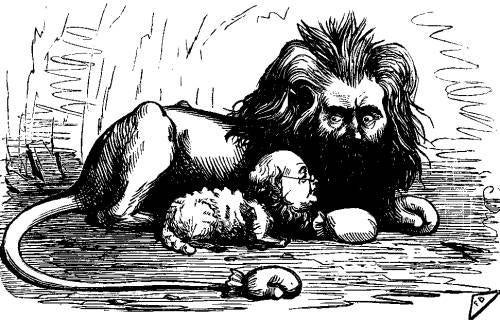 THE POLITICAL MILL-ENNIUM. HINTS UPON HIGH ART. Observant visitors to the National Academy of Design will allow that a tendency to greatness is beginning to develop itself in certain directions among our artists. In landscape some of them are almost immense. The works of PORPHYRO warm the walls with rays of splendor, or cool the lampooned sight-line with pearly gradations, as the case may be. MANDRAKE renders feelingly the summer uplands and groves, and SILVERBARK the melancholy autumnal woods. BYTHESEA infuses with sentiment even the blue wreaths of smoke that curl up from the distant ridge against which loom the concentrated lovers that he selects for his idyllic romances. Gushingly he does his work, but thoroughly; and there are other flowers than lackadaisies to be discerned in his herbage. GUSTIBUS blows gently the foliage aside, and gives us glimpses through it of rural contentment in connection with a mill, or some other interesting object beyond. The pencil of SAGEGREEN imbues canvases, both large and small, with infinite variety and force; and it is to SKETCHMORE that the great lakes owe their remarkable reputation as pieces of water with poems growing out of their broad lily-pads. Very tender are the pastoral banks and brooksides of LEAFHOPPER. ELFINLOCKS takes up his pencil, and lo! a hazy, mazy, lazy, dreamy vista where it has touched. But hold! Our critical Incubus has taken the bit between her teeth, and is beginning to run away with us. Stop that; and let our readers enumerate the other first American landscape painters for themselves. Not so strong are our artists in domestic incidents and compositions of life and character. We have STUNNINGTON, to be sure, whose traits of American expression, whether white or colored, are most true to the life; and there's BARLEYMOW, who will twist you an eclogue from the tail of his foreground pig. Others there be; but space has its limits, and we forbear. As for our portrait limners, their name is Legion, and that comprehensive name must go for all. Like BENVENUTO CELLINI they shall be known for their jugs; and their transmission to posterity on the heads of families is a thing to be reckoned on as sure. For the higher flights of art the American painter is by no manner of means endowed with the wings of his native eagle—wings that agitate the cerulean vault, spattering it with splashes of creamy cloud-spray, and churning into butter the stretches of the Milky Way. History has indeed been illustrated by American art, but has it been enriched? The WASHINGTONS and the WEBSTERS, the CLAYS and the LINCOLNS, have had their memories dreadfully lampooned on canvas. Allegory does not inspire the great American pencil. Tall art there is, and enough of it "at that;" but of high art we have none to speak of, except the canvases that are placed over doorways in the galleries of the Academy, and, in the sense of elevation, may consequently be spoken of as high. All this is wrong. Alas! that we should write it. Would that we could right it! And to think of the musty subjects that our historical and allegorical men select. Ho! young men—away with your CHRISTOPHER COLUMBUS; relegate your METAMORA to his proper limbo; let WASHINGTON alone; and LINCOLN; and OSCEOLA the Savage; and POCAHONTAS, and all the rest. Leave them alone; and, taking fresh subjects, dip your brushes in brains, as old OPIE or somebody else said, and go to work with a will. No fresh subjects to be had, you say? Bosh! absurd interlocutor that you are. Here's a bundle of 'em ready cut to hand. We charge you no money for them, and you may take your choice. SUBJECTS FOR WORKS OF HIGH ART. PROVIDENCE tempering the wind to the shorn lamb. ABSENCE OF MIND marking a box of paper shirt-collars with indelible ink. MILTON "going it blind." The late Mr. WILLIAM COBBETT teaching his sons to shave with cold water. ST. PATRICK emptying the snakes out of his boots. TRUE LOVE never running smooth. NO MAN acting Hero to his valet de chambre. ROBERT BONNER taking DEXTER by the forelock with one hand, and TIME with the other. Subjects like these might be worked out to advantage. The field in which they are to be found is almost unlimited; and they possess abundantly the two grand essentials to success in art at the present time, as well as in literature—novelty and sensation. H.G. and Terpsichore. AMONG the strange revelations about Tribune people elicited during the MCFARLAND trial, was the bit of gossip about Mr. GREELEY going to Saratoga to "trip the light fantastic toe." That Mr. GREELEY'S toe is "fantastic," every body who has ever inspected his "Congress gaiters" must know, but as to its lightness we have our doubts. "What I know about dancing" would be a capital subject for H.G. to handle, and we hope that he will take Steps for doing it. Sweeny's New Charter. How doth the busy Peter B.,
Improve each shining hour!
From nettled young Democracy,
He plucks the safety-flower. From Rome. The POPE is said to be "out of Spirits." Why doesn't he come to New-York, where he can get plenty of the article, either in the sense of the Tap or in that of the Rap? "He who was Born to be Hanged," etc. On one of the mornings of the MCFARLAND trial, a very importunate person attempted to force his way into the court-room, which, as he was told, was already crowded "to suffocation." To this he retorted that he "wasn't born to be suffocated." That's in substance what the late JACK REYNOLDS said, and he was mistaken. The Difference. Rice riots are reported as raging in all the ports of Japan. Rye was the principal mover in the famous conscription riots of New-York. A Celestial Idea. No wonder the Chinese theatre in San Francisco is a success, considering how skilful the actors must be in catching the Cue. JUMBLES. Did you ever hear of my friend BOOTSBY? "No." That's rather queer. I see—you've been out of town. BOOTSBY is a man of standing—of decided standing, I may say. He stands, in fact, a great deal. The heavy standing round he does is enormous when the limited capacity of a single mortal is taken in view. BOOTSBY stands round among every class of people, and especially of politicians and potationers. He stands round to talk, to hear, and especially to drink. The power of the man in this last matter is wonderful, and the puzzle is, that his standing (and perpendicularity) is not perceptibly affected. Of course there are times when BOOTSBY'S standing is not so good. In so slippery a place as Wall Street, it is found to be less certain; while in a crowd on Broadway, waiting for a bus, it cannot be said to maintain a very remarkable firmness. But as a whole, and as the world goes, BOOTSBY is a man of standing. In the altitude of six feet ten, he may be called a man of high standing. He feels proud of the fact. "Is it not better to be a mountain than a mole?" he often asks in a proudly sneering manner of his neighbor PUGGS, who is about as far up in the world as the top of a yard-stick. It is very true that size is not quality, and a seven-footer may be no better than a three-footer; but it is observed that a Short Man is rarely any thing else. His stature is his measure throughout. My own impression of myself is, that I don't care to be short; but if the alternative were forced upon me, I should choose that of person rather than of purse. BOOTSBY does not care much about money, and he carries very little. Some people are like BOOTSBY, but most people are not. The ladies, it is true, never, or rarely, want money. Like newspapers and club-houses, they are self-supporting. In fact they surround themselves with supporters which stay tightly. Mrs. TODD is peculiar in her wants pecuniary. She, good soul, never wants (or keeps) money long, but she doesn't want it little. She prefers it like onions, in a large bunch, and strong. The reason why most women do not want money is because they have no use for it. They never dress; they never wear jewelry; silks and satins have no charms in their eyes; laces, ribbons, shawls never tempt. To exist and walk upright in simpleness and quiet is the sum of their desires. Dear creatures! how is it that they never want? My neighbor, Mr. DROWSE, desires to know where you get all your funny things for PUNCHINELLO? He knows they are there, does Mr. DROWSE; for he gets my copy of the penny postman, and he keeps it, too. It is the only good taste my neighbor has displayed of late years. I tell Mr. DROWSE that you make your fun. He further asks, Where? I tell him in the attic—up there where they keep the salt. He desires to know the size of attic. Of course he has never seen your noble, capacious, alabaster forehead, else he would perceive the source of those scintillations of light and warmth which radiate throughout the universe every Saturday for only ten cents. He is curious also to know about the salt, and doesn't comprehend how or where you use it. He used to use it when a boy in catching birds by putting the briny compound on the tails of the same, and that he used to call "fun alive;" but he don't see it—the salt—about PUNCHINELLO. I suspect Mr. DROWSE doesn't see the sellers, (certainly he avoids them when PUNCHINELLO is offered, much to my mortification, and one dime to my cost,) and so is not likely to discern the source of the fun. I merely informed Mr. DROWSE that the editor was very tall, very handsome, with very black skin and rosy hair, (at which he opened his eyes with astonishment, and asked if I meant so; at which I said, "Yes, I guess so,") and that he laughed out of his nose, eyes, head, and hands, as well as his mouth. DROWSE wants to see the editor very much. He has seen men with black skins and hearts, (for he used to know lots of politicians;) but wants to put his vision on some "rosy hair"—and when he does, no doubt his gaze will be fixed. It is healthy sometimes to have the gaze fixed; and often, like sauce-pans and sermons, it has to be fixed. When Mr. DROWSE calls at 83, please show him in Parlor 6 with the Brussels, fresco-work, and lace curtains. April is a model month. So serene, steady, clear, and balmy. Nothing but blue sky, gentle zephyrs, kissing breezes, genial suns by day and sparkling stars by night. PUNCHINELLO no doubt likes sparkling stars—stars of magnitude—stars that show what they are. PUNCHINELLO perhaps goes to NIBLO'S, and not only sees plenty stars, but plenty of them. But of April. It is called "fickle;" but that's a slander. "Every thing by turns and nothing long"—that is a libel on which a suit could be hung. The same vile falsehood is cruelly uttered of some women, when every body knows, or should know, that these same women are nothing of the sort. Who ever knew a fickle woman? Where in history is there record of such an Impossibility? Fickle—that implies a change of mind. What woman ever changed her mind any more than her hands? Nonsense, avaunt!—banished be slander! April is not fickle—woman is not fickle. As one is evenly beautiful, divinely serene, bewitchingly winning, so is the other sunny, cerulean, balmy, paradisiacal. April for ever—after that the rest of the calendar. Does PUNCHINELLO believe in the Woman Movement? TODD does. He believes woman should move as much as man; and he regards her movement in such numbers to the great West as full of hope (and husbands) for the sex. Mrs. TODD has not as yet been irresistibly seized by the movement; but if TIMOTHY knows himself, he longs for the day when the seizer may come. Although TODD—who is the writer of this epistle—says it, who perhaps shouldn't, lest the shaft of egotism be hurled mercilessly at him, he does unhesitatingly say that to aid this movement he would make the greatest of sacrifices. He is willing to sacrifice his wife and other female relations upon the sacred altar of the movement, and contribute liberally to the expense thereof. He is quite willing they should vote—early and often, if need be; but he wishes to see the movement go westward like the Star of Empire—westward viâ cheerful Chicago. TODD trusts PUNCHINELLO will espouse this movement; for if it does, it—the movement, no less than PUNCHINELLO—will go straight onward and upward; but not by the route known as the Spout. Mucilage is a good thing. It is now extensively used in Church, State, and Society. We use it largely at the Veneerfront Avenue Church, of which Rev. Dr. ALEXANDER PLASTERWELL is pastor. Of course, Mr. PUNCHINELLO, you know that distinguished church, and have no doubt often listened to the distinguished Dr. PLASTERWELL. He is a kind man, has a high forehead, a Roman (Burgundy) nose, and a sweet, soft head—I should say heart. He has—great and good man—the largest faith in mucilage. He often makes it a text, and he sticks to it, he does—does Dr. PLASTERWELL. Nothing like mucilage, PUNCHINELLO. It is the hope of the human race, and the salvation of woman. It is the Philosopher's Stone in solution; the essence and link which connects and cements all that is great, good, and lovely, in the past, present, and future. At least, such is the humble opinion of TIMOTHY TODD. HINTS TO CAR CONDUCTORS. When standing in Printing House Square, your destination being Grand Street Perry or Bleecker Street, if a stranger asks whether you are going to Harlem, nod, as it is considered improper to answer in the negative. If he finds out the mistake, you can plead deafness. When called upon to stop, never attempt to comply. There are several reasons why you should not. In the first place, if you did stop, it would show that you have no will of your own, and since the passage of the Fifteenth Amendment, all men are equal in this country. You may stop about two blocks from the place named, just to please yourself and prove your independence; but take particular care to start the car when the passenger is half off the steps. If there is a young surgeon in the neighborhood, you can enter into an arrangement to break arms and legs in this way with impunity, have the maimed "carried into the surgery," and share the fees with the operator. Occasional cases of manslaughter may take place; but don't mind that, as coroners' juries in New-York will return verdicts of "death from natural causes." Besides this, remember that you have a vote, and that both coroners and judges are dependent upon the people. When a lame old gentleman hails you, beckon him furiously to come on, but be sure, at the same time, to urge the driver to greater speed. It is no part of your business to have change, so never give any, but drive on: people should provide for and look after their own business and that is none of yours. Always drive through the centre of a target company or funeral procession, never minding whether you kill one or more, and then abuse the captain or the undertaker for his stupidity. By the adoption of these essential rules, and by adding a good deal of incivility, you will soon reach the top of the wheel of your profession and in due time have a testimonial presented to you by an admiring and grateful public. Out in the Cold. Commissioner Tweed proposes a new outside Bureau of the Department of Public Works, for late-Commissioner MCLEAN. He is to be Superintendent of Refrigerators. 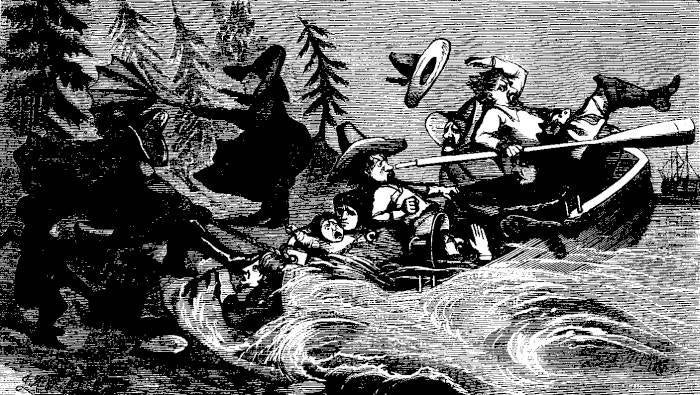 THE LANDING OF THE PILGRIMS. ENGRAVED BY SPECIAL PERMISSION FOR PUNCHINELLO, FROM THE ORIGINAL PAINTING, BY MILES STANDISH, IN THE COLLECTION OF METHUSELAH PILGRIM, ESQ., OF PILGRIMSVILLE, MASS. TO CAPTAIN HALL. (IN ANTICIPATION OF HIS TRIP TO THE POLE.) HALL! HALL!
D'ye hear our call?
Or, do you fancy it to be
A weather sign—merely the pre-
Monition of a squall
At sea!
HALL!
You pay no heed at all.
Nevertheless, O hardy mariner!
(A Snow-Bird brings this with our kindest love,)
We're sorry you prefer
Those frigid walks (ever so far above
The 80th parallel, we guess!)
To stocks, and tariffs, and domestic bliss;
Yes, yes,
Captain, we're sorry it has come to this!
Why do you madly thirst
For grog that's chopped up with a hatchet? say!
And tell us of the first
Strange thought which spurred you to go up that way!
Was it the hope that on some icy coast
(Frozen, yourself, almost!)
You'd have the luck to meet poor FRANKLIN'S ghost?
And has it seemed, sometimes,
That drowning might be pleasanter up there
Among the icebergs, native to those climes,
Than where
The surf breaks gently on some coral-reef,
And sirens sweetly soothe one's slow despair?
Say, was that your belief?
And who is BENT?[*]
Why was he sent,
With his Warm Currents wheeling round the Pole?
A long, long race must his disciples run:
No sun,
No fun,
No chance to toss a word to any one;
And what a goal?
As hopefully you munch
The flinty biscuit, watching whale or seal,
Or listening, undaunted, to the crunch
Of ice-floes at the keel,
Say, Sir Intrepid! shall you really think
You pioneer the navies of the world?
Not while the chink
Of well-housed dollars sounds so pleasantly,
And safer tracks map out the treacherous sea!
If that's your dream, oh! let your sails be furled.
But, no!
It is not this! Your spirit, high and bold,
Scorning all tamer joys, will have it so!
No cold
Can chill its ardor! Such a soul would sate
Its deathless craving in some lofty flight,
Some deed sublime, and read its shining fate
By the Aurora's light!
For fruitful fellowship, it seeks the wild,
The frozen waste,
Where the world's venturous heroes—reconciled
To sunless, shuddering gloom—
To joyless solitude—with ardor taste
Their dread delights! and so at last find room,
'Mid nodding icebergs, for their watery tomb!
For this, we spare you,
O dauntless HALL! Once having breathed that air
So pure, so fresh, so rare!
And caught the wildness of the Esquimaux,
We declare you
Unfit to live where beans and lettuce grow!
Leave delving to the little pitiful mole,
Great soul!
And now, then, for the Pole! [*] Captain BENT, of Cincinnati, originator of the new theory of Polar Currents. 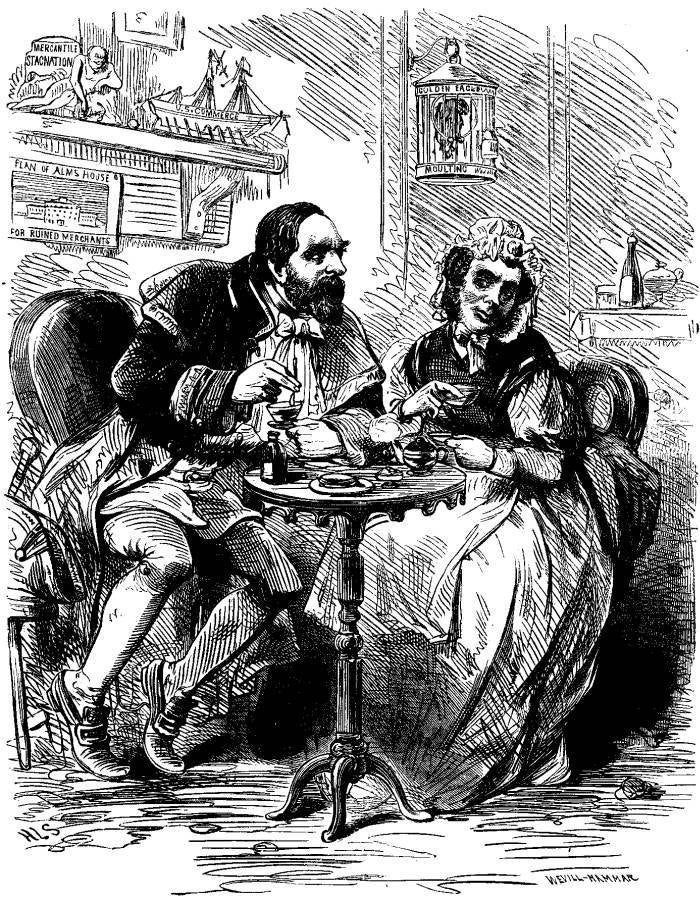 FINANCIAL RELIEF MR BUMBLE BOUTWELL TO MRS. CORNEY FISH. (See Oliver Twist.) "THE GREAT PRINCIPLE OF FINANCIAL RELIEF IS TO GIVE THE BUSINESS MEN EXACTLY WHAT THEY DON'T WANT: THEN THEY GET TIRED OF COMING." CONDENSED CONGRESS.
SENATE.
Mr. WILSON didn't see the use of all this legislation to protect animals. Animals had no votes, although he admitted a partial exception, in that every bull, it had its ballot. But he had something practical. Here was a jolly job, the Pacific Railway grant. There was a good deal more in it than they had made out of any other GRANT. Mr. THURMAN'S suggestion, that this land ought to be occupied by actual settlers, he scorned. "Actual settlers" were of a great deal more use to him in Massachusetts, where they could vote for him, than in the territories, where that boon would not be extended to them. It was much better that they should be occupied by imaginary settlers, who could pay and not vote. Actual "settlings" were the dregs of humanity. The Georgia bill came up, as it does every day with much more regularity than luncheon. The Senate has succeeded in muddling it to that degree of unintelligibility that nobody has the slightest notion what it provides. It is, therefore, in a condition to give rise to infinite debate. After several senators had said enough for a foundation for thirty columns each in the Globe, they let it go for the present. The present was the one promised by Senator WILSON in return for the Pacific Railway grab grant. HOUSE. The House is given over to the tariff. A very indelicate discussion has been had upon corsets. Mr. BROOKS was of opinion that the corset would tariff it were subjected to any more strain in the way of duties. Mr. MARSHALL remarked that the corset avoided a great deal of Waist. It was whalebone of his bone, or something of that sort. It was one of the main Stays of our social system. Mr. SCHENCK made another speech. He ripped up the foreign corset in a truculent manner. He said that American corsets were far superior, only American women had not the sense to see it. The effect of taking off the duty on corsets would be to take off the corsets. Mr. BROOKS called the hooks and ayes on the corsets. Mr. SCHENCK opposed the call. He had found a simple tape much preferable. He wished a coffer-dam might be put upon the roaring BROOKS. Somebody at this point brought up a contested election case; but Mr. LOGAN objected to its being considered. What, he asked, was the use of wasting time? There was money in the tariff. There was no money at all in voting a Democrat out, and a Republican in. They could do that any day in five minutes. His friend Mr. BUTLER had recently remarked, one Democrat more or less made no difference. But Mr. BUTLER forgot that the larger the majority, the larger the divisor for spoils, and therefore the smaller the quotient and the "dividend." He did not know much about arithmetic. He had never been at West Point; but he believed that a million dollars, for instance, would go further and fare worse among two hundred men than among three. If the House were not careful, there would be a glut of Republicans in it, and the shares would be pitifully meagre. As for him, he had a great mind, (derisive cheers)—he repeated, that he had a great mind to vote for a Democrat next time. In spite of Mr. LOGAN'S warning, the House voted in a couple or so of Republicans, and then resumed the duty on wool. Mr. Cox thought this wool had been pulled over the eyes of the house often enough. It reminded him of an expedition, of which Mr. LOGAN had never heard, in search of a "Golden Fleece." Mr. JENCKES, and Mr. SCHENCK, and Mr. KELLEY called him to order in behalf of their constituents, who were in the wool business, and said that "wool" in one form or another had always been the staple of their political career. Mr. BUTLER said he had a little game worth two of that. He wanted to buy San Domingo. In this there were plenty of commissions, and hundreds of thousands of colored votes. FIFTEENTH AMENDMENT. ALDERMANIC RECEPTION UP-TOWN. CAESAR, walk in! Ah POMPEY! how d'e do?
This way, CLEM! Gentlemen, please walk right through!
GEORGE, how's your mother? Fine day, PETE—fine day!
Well, how are things down there at Oyster Bay?
Ah AUNTIE! how's your rheumatiz, this spring?
Well, Mr. JOHNSON, did you try that sling?
Why, this is Uncle STEVE! How-do-you-do.
Uncle? Sit down. What can I do for you?
Well, Mr. PRINCE! You must be busy, now.
Whitewashing is the best thing done, I vow!
Why, hel-lo! REGIS! From the Cape so soon?
When do you open, this year—first of June?
Come, gentlemen—some wine? Now, don't refuse!
What! temperate? teetotal? Well, that's news!
And good news, too! Well, coffee, then. You see,
My friends, the sentiment's the thing with me.
The real Mocha, AUNTIE! Simon pure!
Raised by free Arabs. For I can't endure
A single thing that's flavored with a Wrong!
Yes, AUNTIE, you are right, I've "come out strong!"
So have the Colored People, I may say!
(One fact explains the other, up this way!)
They've proved their strength! It's settled, sure as a gun,
That every Colored Voter now counts One!
Now, gentlemen, you'll be surprised to find
So many people with your turn of mind!
But, sure as tricks! remember what I say—
You'll learn some things before Election Day!
POMPEY—'twon't take much time, (and you can spare it!)
Try this old fiddle, picked up in the garret!
Good? It's your fiddle! AUNTIE, here's a pound
Of that same genuine Mocha, ready ground!
Say, Uncle STEVE, I've got a fish for you,
Down at the market. Call again, PETE; do!
I'll have a job for you and CAESAR soon:
It's only waiting for a change of moon.
CLEM, how'd you like a chance to wait on table?
Or, would you rather drive, and run my stable?
GEORGE, in the kitchen there's a pan of souse!
Going? All gone? Now, BRIDGET, air the house! Historic Parallel. THE JACK CADE movement came near destroying London. The Ar-Cade movement threatens to destroy Broadway. 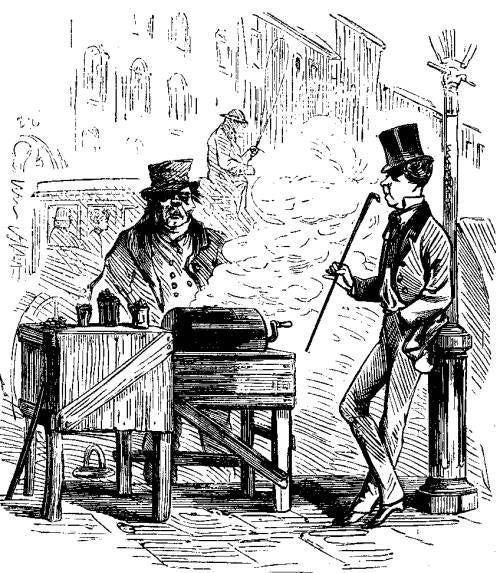 A CHEAP LUXURY. SNIFFLES LOVES THE SMELL OF ROASTED CHESTNUTS, AND ENJOYS IT FOR HOURS EVERY DAY; BUT HE NEVER EATS ANY—WHICH ACCOUNTS FOR THE JOYOUS EXPRESSION ON THE FACE OF THE VENDER. |
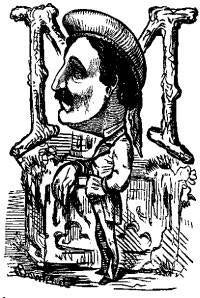 EN AND ACRES, the new comedy at WALLACK'S, is one of the best of TAYLOR'S pieces, and a decided improvement upon the carpenter work of BOUCICAULT. It has been rechristened by Mr. WALLACK, and its former name—Old Men and New Acres, or New Aches and Old Manors, or something else of that sort—has been conveniently shortened. If it does not convince us that the author has improved since he first began to write plays, it certainly reminds us that there is such a thing as Progress. In the latter play, Mr. J.W. WALLACK was a civil engineer. In the present drama, he is an uncivil tradesman. Both appeal to the levelling tendencies of the age; and in each, the author has done his "level best"—as Mr. GRANT WHITE would say—to flatter the Family Circle at the expense of the Boxes.
EN AND ACRES, the new comedy at WALLACK'S, is one of the best of TAYLOR'S pieces, and a decided improvement upon the carpenter work of BOUCICAULT. It has been rechristened by Mr. WALLACK, and its former name—Old Men and New Acres, or New Aches and Old Manors, or something else of that sort—has been conveniently shortened. If it does not convince us that the author has improved since he first began to write plays, it certainly reminds us that there is such a thing as Progress. In the latter play, Mr. J.W. WALLACK was a civil engineer. In the present drama, he is an uncivil tradesman. Both appeal to the levelling tendencies of the age; and in each, the author has done his "level best"—as Mr. GRANT WHITE would say—to flatter the Family Circle at the expense of the Boxes.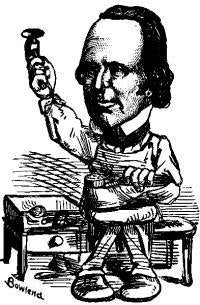 MR. SUMNER said he was the friend of the oppressed. That, as was well known, was his regular business. Unfortunately, the Fifteenth Amendment had rendered the colored man incapable of being hereafter regarded as an oppressed creature. He was sorry, but it could not be helped. He was therefore forced to go down the chromatic scale of creation and find another class of clients. He found them in cattle. HOMER had sung about the ox-eyed Juno, and WALTER WHITMAN about bob veal. COWPER had remarked that he would not number in his list of friends the man who needlessly set foot upon a cow. He mentioned these things merely to show that railway companies had no right to starve cattle. He proposed an amendment to the Constitution, to provide that a dinner of at least three courses should be given to cows daily. Mr. DRAKE was heartily in favor of the proposition. He had got his feet in a web, so to speak, by paddling in the political waters of Missouri, and some people had gone so far as to call him "quack." He demanded redress.
MR. SUMNER said he was the friend of the oppressed. That, as was well known, was his regular business. Unfortunately, the Fifteenth Amendment had rendered the colored man incapable of being hereafter regarded as an oppressed creature. He was sorry, but it could not be helped. He was therefore forced to go down the chromatic scale of creation and find another class of clients. He found them in cattle. HOMER had sung about the ox-eyed Juno, and WALTER WHITMAN about bob veal. COWPER had remarked that he would not number in his list of friends the man who needlessly set foot upon a cow. He mentioned these things merely to show that railway companies had no right to starve cattle. He proposed an amendment to the Constitution, to provide that a dinner of at least three courses should be given to cows daily. Mr. DRAKE was heartily in favor of the proposition. He had got his feet in a web, so to speak, by paddling in the political waters of Missouri, and some people had gone so far as to call him "quack." He demanded redress.